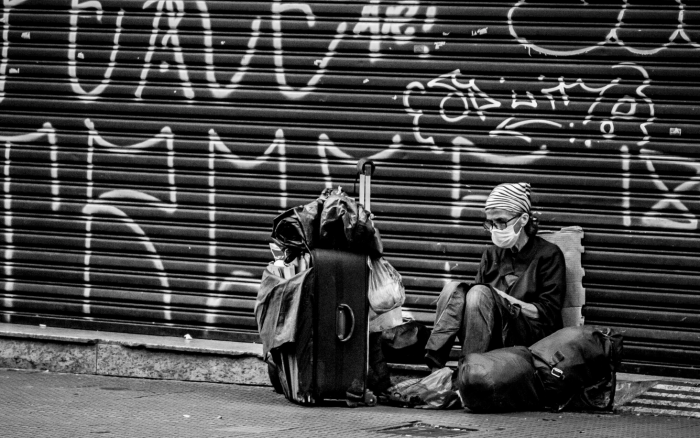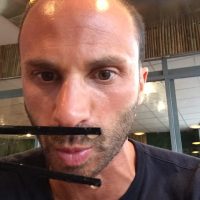If I lived on the other side of this wall, lean and hungry, under threat, and my body worked, and I could scrounge up the cash, and all the legal routes through this wall were closed to me, ensnared in red tape, I’d take a shot and break the law, hoping to sink my teeth into those for real American opportunities—the kind of opportunities you feel when you open your fully stocked fridge or wire money to your mom or turn your lights off for bed in a nonviolent neighborhood.
The Southwest has some of the most stunning terrains in this country, and yet it has also become the land of for-profit prisons and children in cages. Southern Arizona will hit 100 degrees every day this week. I imagine those overflow detention centers will be broiling, hellish.
Where is Stephen Miller sleeping tonight? How cool does he keep his room?
Nogales and Tucson are different colors than I’m used to, bleached out, baked in a copper haze. Any pocket of green is an eco-disaster luxury straining the fragile water supply.
Don’t make eye contact with the border patrol agents; they will beat the living sh*t out of you, even the women. Sometimes I see cops and say to myself, “I could outrun that clown,” but none of these agents are clowns.
Based on their severe faces and fit bodies, they must filter through a level of training most police never touch. Their presence is thick down here, they walk into Safeway with guns as their terrifying German Shepherds bark in the parking lot, and I’ve never seen so many cars pulled over on such a short stretch of highway.
It makes the air feel tense like big tragedies could happen any second.
No amber alerts or silver alerts on the electronic highway signs here. All the highway alerts are focused on wildfires—and what fires closed down which highways—a pretty apocalyptic Cormack McCarthy messaging system.
It’s New England January here in reverse: you stay inside a lot, shuttling to and from indoor spots, existing in shade and air conditioning. The local faces look sunburned and dazed as if the whole town has been drinking, getting pickled, developing that sweaty alcoholic sheen.
A small thrill to drive around this small city, where the streets stay wide open and swift even at 5 p.m.
I parked for four hours and paid two dollars—unthinkable numbers in Miami. You really don’t need much to live large in Tucson, and even the compounds in the Catalina Foothills are relatively cheap. I may have to buy a compound here and adopt some wolf dogs.
Coming up through southern New Mexico, the warm oven air flares open your nostrils while way out there, ghostly dervishes of dust spin up from the dry ground—mini-tornadoes reminiscent of a grieving woman wringing out her arms, pacing madly, inconsolable, like she just lost a daughter.
There’s something mean about a cattle guard when you picture a sweet bovine girl that just wants to wander across the tracks for some better grass but can’t because the metal will tangle up her hooves.
Remarkable how many unpopulated acres of United States land exist, how sparse the clusters of wind turbines and solar panels are in this vastness. 2021 and the Union Pacific trains keep chugging down long lines of black cylinder cargo cars laden with natural gas—it’s just sloshing around in there, waiting to be burned up.
The three-digit population towns haunt me most, places where the main employers are Wal-Mart, fast food, Circle K. Rural poverty is bleak and always looks the same: the men are meth-thin, the women KFC-large, and so many of the kids have doughy bellies that strain against their T-shirts.
White lifespans are in decline as deaths of despair from overdoses and suicides skyrocket.
What a powerful person you must be to explode out of that cycle, invent a new way of living that bears little resemblance to everyone around you. I’m so glad Francis McDormand brought her magic to “Nomadland”—she was just heartbroken and grieving on the margins, gave everyone a full-screen look at a razor-thin existence, the hustle, and isolation of that life.
Also, the first time a camera nosed its way into an Amazon warehouse, capturing what those non-unionized bodies endure to get our orders boxed and processed with no delay. “Nomadland” is our 21st century Grapes of Wrath.
Desert birds are so chatty at dawn, and it’s refreshing to hear real dogs barking in the valley. Dogs in Miami wear hair barrettes and get pushed in baby strollers, but the dogs in Taos sleep outside in the cold, and when they bark, it’s deep and powerful.
Romanticizing a place will always leave you disappointed. Santa Fe is meh, a fake place built for ice cream tourists and pretty paintings that all blur together from one art gallery to the next. Taos is so different—it truly has a soul, and the air is perfumed from these purple blossoms on the Clint Eastwood western cowboy trees, especially at dusk.
Yesterday afternoon I drank under cottonwoods with an older native man named Robert and some other characters who just joined in until the whole patio was discussing Earthship-style homes and UFOs with an all-in intensity that comes after the third beer.
Our conspiracy theories around the election and vaccines are ripping us apart, but occasionally I enjoy UFO discussions, and Robert’s stories were by far the best I’ve heard so far.
Here’s my favorite: Robert, in the 1960s, a young kid driving home from a cousin’s graduation in northern New Mexico, and the whole family spots a disc hovering above a hill, but when they pull over, no one can grab the old Polaroid from the back because they’re all mouth-open-stunned, paralyzed.
Afterwards, his Catholic mom had to reassess her relationship to god and decided her god wasn’t just hers anymore but belonged to a much larger, more active universe than she had previously imagined.
One of my favorite things in the world is buying beers for good people and having beers bought for me by good people, and keeping all that lovely conversation animated, dream-like.
Today I’m thinking of you more than ever, over this wall, weighing your options, and hungry for a new life. You’re probably even edgier than before.
Last week, my vice president landed in Guatemala and lowered her K95 mask to tell your entire region of the world, “Don’t come.”
That poor, flustered woman has a strong point: the trek is dangerous, and you could die, but you’ve known these truths for years. What you may not know is how hard it can be on this side of the wall—how demoralizing even for a natural-born citizen.
There were years, despite my light skin and college degrees, when I couldn’t get one motherf*cking door to open no matter how hard I yanked the latches. Sometimes I ate cereal for dinner, and everyone kept telling me I was too gaunt.
This could happen to you, and this will likely happen to you.
But I hustled and got lucky, and I know you’re ready to hustle and get lucky—the hustle is in your bones, and the luck always comes, maddeningly slow, often in fleeting bursts. And I don’t care if you have a plan if you’re not a “model immigrant.”
On bad nights you might get drunk and vomit in the bushes. I’ll vomit in the bushes with you.
Where you’re at today isn’t going to improve in your lifetime—it just isn’t—and if you want to get mathematical, the chances of something good and non-tragic happening here are greater than where you stand today.
So I recommend you ignore my vice president, get packing.
It’s time to move yourself North, to find some way through this wall.
~







Read 1 comment and reply